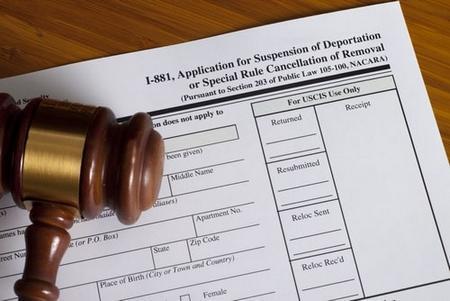When Can Immigrants Receive Cancellation of Removal Due to Hardship?
 For immigrants to the United States who are undocumented or who do not have the protections provided by a Green Card, the threat of deportation is ever-present. When a foreign-born person and their family members have established lives in the U.S., the possibility that they may be required to uproot themselves and move to another country can be very troubling. Fortunately, those who are involved in deportation proceedings may have a number of options for defense, including applying for cancellation of removal. In many cases, these applications will be based on claims that a deportation will cause hardship for a person’s family members. By understanding what constitutes hardship and how to demonstrate that hardship will occur, a family can make sure they are taking the correct steps to defend against deportation.
For immigrants to the United States who are undocumented or who do not have the protections provided by a Green Card, the threat of deportation is ever-present. When a foreign-born person and their family members have established lives in the U.S., the possibility that they may be required to uproot themselves and move to another country can be very troubling. Fortunately, those who are involved in deportation proceedings may have a number of options for defense, including applying for cancellation of removal. In many cases, these applications will be based on claims that a deportation will cause hardship for a person’s family members. By understanding what constitutes hardship and how to demonstrate that hardship will occur, a family can make sure they are taking the correct steps to defend against deportation.
Proving Hardship in Deportation Cases
Immigrants may qualify for cancellation of removal as permanent residents if they have been lawful permanent residents for 5 years or more, have lived in the United States for a minimum of seven years, and they do not have any convictions for aggravated felonies. Cancellation of removal is also available for Immigrants who are not lawful permanent residents. In these cases, a person must have been living in the United States for a minimum of 10 years, they must not have been convicted of crimes involving moral turpitude or other types of crimes that would jeopardize their immigration status, and they demonstrate good moral character. In addition to these requirements, a non-permanent resident will need to show that their deportation would cause hardship for one or more family members who are lawful permanent residents or U.S. citizens.
A hardship that would affect a person’s spouse, child, or parent must be “exceptional and extremely unusual,” meaning that it must substantially exceed the hardship that a family would be expected to experience if the person is required to leave the United States. Examples of hardship that may potentially qualify for cancellation of removal may include:
-
An immigrant is the sole caretaker of an elderly Green Card holder parent who suffers from a medical condition that has made it impossible for them to care for themselves fully. Since deportation would leave the parent without any assistance, the immigrant may be allowed to remain in the U.S. so that they can continue providing the necessary care.
-
An immigrant’s U.S. citizen minor child would not be able to live with relatives if their parent was deported, and they do not speak the language used in the parent’s home country. Because the child has no prospects for continuing to live in the United States without their parent, and they would be unable to pursue educational opportunities in the parent’s home country, the parent may be allowed to continue living in the United States to ensure that the child can pursue opportunities as a U.S. citizen.
Contact Our Illinois Deportation Defense Attorneys
If you are facing deportation, Mevorah & Giglio Law Offices can help you determine whether you qualify for cancellation of removal. Our attorneys can help you gather and submit evidence showing that your deportation would cause hardship for your family members. We will provide representation throughout removal proceedings, and we will fight to make sure you and your family will be able to continue living in the United States. Contact our Illinois cancellation of removal lawyers today at 630-932-9100 to arrange a free consultation.
Sources:
http://uscode.house.gov/view.xhtml?req=granuleid%3AUSC-prelim-title8-section1229b&num=0&edition=prelim
https://www.justice.gov/sites/default/files/pages/attachments/2015/07/24/eoir42b.pdf
https://www.ilrc.org/sites/default/files/resources/non_lpr_cancel_remov-20180606.pdf
 English,
English,
 Spanish,
Spanish,
 Polish,
Polish,
 Urdu
Urdu













 Make a Payment
Make a Payment



